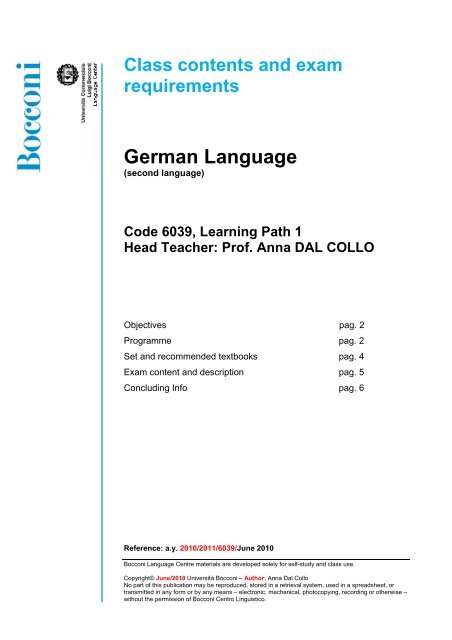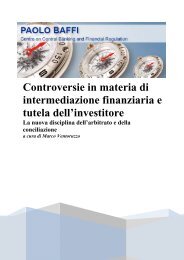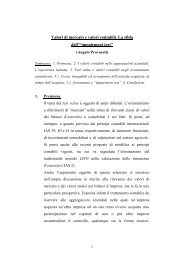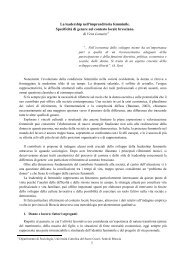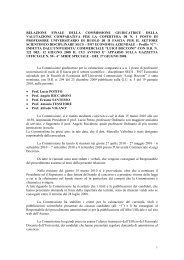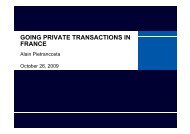Code 6039, Learning Path 1 Head Teacher: Prof. Anna DAL COLLO
Code 6039, Learning Path 1 Head Teacher: Prof. Anna DAL COLLO
Code 6039, Learning Path 1 Head Teacher: Prof. Anna DAL COLLO
Create successful ePaper yourself
Turn your PDF publications into a flip-book with our unique Google optimized e-Paper software.
Class contents and exam<br />
requirements<br />
German Language<br />
(second language)<br />
<strong>Code</strong> <strong>6039</strong>, <strong>Learning</strong> <strong>Path</strong> 1<br />
<strong>Head</strong> <strong>Teacher</strong>: <strong>Prof</strong>. <strong>Anna</strong> <strong>DAL</strong> <strong>COLLO</strong><br />
Objectives pag. 2<br />
Programme pag. 2<br />
Set and recommended textbooks pag. 4<br />
Exam content and description pag. 5<br />
Concluding Info pag. 6<br />
Reference: a.y. 2010/2011/<strong>6039</strong>/June 2010<br />
Bocconi Language Centre materials are developed solely for self-study and class use.<br />
Copyright© June/2010 Università Bocconi – Author: <strong>Anna</strong> Dal Collo<br />
No part of this publication may be reproduced, stored in a retrieval system, used in a spreadsheet, or<br />
transmitted in any form or by any means – electronic, mechanical, photocopying, recording or otherwise –<br />
without the permission of Bocconi Centro Linguistico.
German Course - <strong>Code</strong> <strong>6039</strong><br />
a.y. 2010/2011/<strong>6039</strong>/June 2010<br />
GERMAN AS SECOND FOREIGN LANGUAGE – code <strong>6039</strong><br />
The course is aimed at students who have chosen German as their second foreign<br />
language. It runs over one year and the exit level is set at A2 (elementary).<br />
The course ends in an exam which, once passed, gives the student two credits and which grade<br />
forms part of the overall final degree grade average.<br />
Students can also choose to take a partial exam during the year which, if passed, adds one<br />
thirtieth to the final grade.<br />
Programme<br />
The syllabus covers all the units in the set Textbooks. In addition to the classroom teaching<br />
students are also required to complete a self-study programme. The activities in this need to be<br />
carried out in conjunction with the class work (up to five hours per week) in order to constantly<br />
reinforce the lessons learnt and prepare for the exam. Students who actively participate in the<br />
course by attending at least 70% of the lessons and completing on time self study programme will<br />
be awarded one thirtieth to their final exam grade.(see “Exam” below for further details).<br />
Topics/Units* Grammar<br />
Kommunikation<br />
A1<br />
Unit 1, 2, 3<br />
Menschen und Häuser<br />
A1<br />
Unit 4<br />
Termine<br />
A1<br />
Unit 5<br />
Orientierung<br />
A1<br />
Unit 6<br />
Berufe<br />
A1<br />
Unit 7<br />
Berlin<br />
A1<br />
Unit 8<br />
Nomen: Singular und Plural<br />
Artikel: der, das, die/ ein, eine<br />
Verneinung: kein, keine<br />
Personalpronomen<br />
Verben: Präteritum von sein<br />
W-Frage, Aussagesatz und Satzfrage<br />
Zahlen, Komposita<br />
Possessivartikel im Nominativ<br />
Artikel im Akkusativ<br />
Adjektive im Satz<br />
Präpositionen und Zeitangaben<br />
Zeitangaben machen<br />
Präteritum von haben<br />
Trennbare Verben<br />
Dativ<br />
Präpositionen: in, neben, unter, auf, vor, hinter,<br />
an, zwischen, bei und<br />
mit + Dativ<br />
Ordnungszahlen<br />
Modalverben: müssen, können<br />
Akkusativ<br />
Präpositionen + Akkusativ und Dativ<br />
Modalverb: wollen<br />
Self-study<br />
programme**<br />
ST: pag. 24-29; 38-<br />
43; 52-57<br />
AB: Im Büro<br />
ST: pag. 68-81<br />
AB:<br />
Possessivartikel<br />
oder unbestimmter<br />
Artikel?<br />
AB: Möbel im Büro<br />
und zu Hause<br />
AB:<br />
Wohnungsanzeigen<br />
ST: pag. 92-97<br />
AB: Verneinen mit<br />
nicht<br />
ST: pag. 106-111<br />
AB: Mit Bus und<br />
Bahn<br />
ST: pag. 120-125<br />
AB: Berufe: Typisch<br />
Mann oder typisch<br />
Frau?<br />
ST: pag. 134-145<br />
AB: Die Stadt und<br />
der Verkehr<br />
2
German Course - <strong>Code</strong> <strong>6039</strong><br />
Ferien und Urlaub<br />
A1<br />
Unit 9<br />
Essen und trinken<br />
A1<br />
Unit 10<br />
Kleidung und Wetter<br />
A1<br />
Unit 11<br />
Körper und Gesundheit<br />
A1<br />
Unit 12<br />
Sprachen und Biografien<br />
A2<br />
Unit 1<br />
Familienalbum<br />
A2<br />
Unit 2<br />
Reisen und Mobilität<br />
A2<br />
Unit 3<br />
Aktiv in der Freizeit<br />
A2<br />
Unit 4<br />
Medien<br />
A2<br />
Unit 5<br />
Ausgehen<br />
A2<br />
Unit 6<br />
Zu Hause<br />
A2<br />
Unit 7<br />
Kultur erleben<br />
A2<br />
Unit 8<br />
Perfekt: regelmäßige und unregelmäßige<br />
Verben<br />
Häufigkeitsangaben: jeden Tag, manchmal, nie<br />
Fragewort: welch-<br />
Komparation: viel, gut, gern<br />
Adjektive im Akkusativ<br />
Demonstrativa<br />
Wetterwort es<br />
Imperativ<br />
Modalverb: dürfen<br />
Personalpronomen im Akkusativ<br />
Nebensätze mit weil<br />
Komparation mit wie und als<br />
Superlativ<br />
Possessivartikel im Dativ<br />
Nebensätze mit dass<br />
Genitiv-s<br />
Modalverb sollen<br />
Reflexivpronomen<br />
Zeitadverbien<br />
Verben mit Präpositionen<br />
Indefinita<br />
Indirekte Fragen im Nebensatz<br />
Adjektive ohne Artikel: Nominativ und<br />
Akkusativ<br />
Personalpronomen im Dativ<br />
Relativsatz, Relativpronomen im Nominativ<br />
und Akkusativ<br />
Modalverben im Präteritum<br />
Nebensätze mit als<br />
Zeitadverbien<br />
Verben im Präteritum: er lebte, ich arbeitete,<br />
es gab<br />
a.y. 2010/2011/<strong>6039</strong>/June 2010<br />
ST: pag. 156-161<br />
AB: Ein Land mit 16<br />
Ländern<br />
AB: Ferien auf<br />
„Balkonien“<br />
ST: pag. 170-175<br />
AB: Lebensmittel<br />
und Küche<br />
AB: Schnelles<br />
Essen: gutes<br />
Essen?<br />
ST: pag. 184-189<br />
AB: Demonstrativa<br />
und<br />
Fragepronomen<br />
AB: Kleider machen<br />
Leute?<br />
ST: pag. 198-207<br />
AB: Die Deutschen<br />
und der Fußball<br />
AB: Husten und<br />
Schnupfen<br />
ST: pag. 16-21<br />
AB: Biografien:<br />
Personenraten<br />
AB: Vergleichen mit<br />
dem Komparativ<br />
ST: pag. 32-37<br />
AB: Familie als<br />
Lebensform<br />
ST: pag. 46-55<br />
AB: Auf dem<br />
Flughafen in<br />
München<br />
ST: pag. 68-73<br />
AB: Ganz schön<br />
sportlich<br />
ST: pag. 82-87<br />
AB: Wortschatz<br />
rund um den<br />
Computer<br />
ST: pag. 96-107<br />
AB: Kaffee ist nicht<br />
gleich Kaffee<br />
AB: Im Restaurant<br />
ST: pag. 120-125<br />
ST: pag. 134-139<br />
3
German Course - <strong>Code</strong> <strong>6039</strong><br />
Arbeitswelten<br />
A2<br />
Unit 9<br />
Feste und Geschenke<br />
A2<br />
Unit 10<br />
Mit allen Sinnen<br />
A2<br />
Unit 11<br />
Erfindungen und Erfinder<br />
A2<br />
Unit 12<br />
Sätze verbinden mit denn / weil<br />
Das Verb werden<br />
Präpositionen mit Dativ<br />
Verben mit Dativ<br />
Verben mit Dativ- und Akkusativ. Ergänzung<br />
Bedingungen und Folgen:<br />
Nebensätze mit wenn<br />
Indefinita<br />
Präpositionen mit Dativ und Akkusativ<br />
Relativsätze: in, mit +Dativ<br />
Nebensätze mit um zu, damit<br />
Passiv mit werden/ wurden<br />
a.y. 2010/2011/<strong>6039</strong>/June 2010<br />
ST: pag. 148-159<br />
ST: pag. 172-177<br />
ST: pag. 186-191<br />
ST: pag. 200-209<br />
*Units refer to Studio d A1 and A2 (see “Set textbooks”)<br />
**The self-study programme refers to:<br />
ST: Studio d A1 and A2 (see “Set textbooks)<br />
AB: Arbeitsblätter. Exercises referring to the units of the set textbook, available on the e-learning.<br />
In order to get the most out of the course, students are also advised to do the exercises available<br />
on the website of the publishing house, respectively at:<br />
� Volume A1: http://www.cornelsen.de/sites/assets/studioda1/index.php<br />
� Volume A2: http://www.cornelsen.de/sites/assets/studioda2/index.php<br />
Set textbooks<br />
� Funk, Kuhn, Demme, Studio d A1, Cornelsen<br />
� Funk, Kuhn, Demme, Studio d A2, Cornelsen<br />
� Reimann, M., Grammatica di base della lingua tedesca, Hueber<br />
4
German Course - <strong>Code</strong> <strong>6039</strong><br />
A2 Exam<br />
a.y. 2010/2011/<strong>6039</strong>/June 2010<br />
The exam consists of a written paper and an oral exam. Both need to be passed for the grade to<br />
count towards the final average. The oral exam can only be taken once the written exam has been<br />
passed (minimum mark 18/30). The pass in the written exam is valid for three oral exams<br />
subsequent to the written exam; if the student does not take the oral exam within this time limit the<br />
written exam will need to be taken again. Students can chose to retake the written exam before the<br />
taking the oral exam but must remember that handing in their paper annuls any previous grade.<br />
Written exam<br />
The written exam is divided in three parts. The final grade is the total score from the three in<br />
thirtieths.<br />
Monolingual and bilingual dictionaries can be used.<br />
Duration of the exam: 120 minutes, after the listening.<br />
Description of exam stages<br />
Listening to the<br />
passage<br />
Contents of exam<br />
Pause Repeat listening to the<br />
passage<br />
120 minutes for the completion of the<br />
written exam<br />
First<br />
part<br />
Listening to brief messages and news: announcements, dialogues ecc..<br />
To identify the subject matter, how it is communicated and the opinion expressed in one<br />
Objective or more listening passages<br />
Exam 1.Sentence completion and/or tables; true/false questions; multiple choice<br />
answers<br />
10/30<br />
Second<br />
part<br />
Grammar exercises<br />
Checking that candidates have a solid understanding of basic grammar (declension,<br />
Objective conjugation, syntax)<br />
Exam Sentence completion, matching, transformation 10/30<br />
Third<br />
part<br />
Reading comprehension of one or more texts, possibly also containing images<br />
Objective Checking candidates’ability to:<br />
-understands texts<br />
-to write structured texts according to the instructions and a format given<br />
Exam Writing a text (letter, summary, memorandum) 10/30<br />
Oral exam<br />
There are two parts to the oral exam: presentation and discussion. The presentation is about two<br />
topics (one chosen by the student, the other by the examiner, taken from Italian or German press)<br />
contained in the course.<br />
It is indispensable that the above-mentioned items are prepared thoroughly for the oral exam and<br />
students are advised to prepare themselves well in advance of the date. Details on how to prepare<br />
for the exam are to be found on line in the library for each language (Bocconi e-learning platform)<br />
5
German Course - <strong>Code</strong> <strong>6039</strong><br />
a.y. 2010/2011/<strong>6039</strong>/June 2010<br />
or at: www.unibocconi.it/centrolinguistico in Laboratori linguistici > Materiali di autoapprendimento<br />
on-line.<br />
Students will be assessed in terms of their practical ability to communicate.<br />
The oral exam grade can be added to or subtracted from the written exam result (minimum 18/30<br />
to access the oral exam) by -3 and + 3 thirtieths.<br />
Duration of the exam: 15 minutes<br />
Description of exam stages<br />
Presentation<br />
Carrying out the tasks (the one chosen by the student and the one given by the<br />
examiner): 10-12 minutes<br />
Discussion Discussion of the topic presented led by the examiners using ad hoc questions<br />
Concluding info<br />
The assessment of language skills depends both on the result of the final exam and on marks<br />
awarded during the year.<br />
Students who pass the partial exam (minimum 18/30), positively participate in the course and<br />
complete the self-study activities on time will be awarded extra points, up to 3/30.<br />
These points have limited time validity and will be will be added to the final grade by the teacher,<br />
as follows:<br />
1. Positive participation to the course<br />
2. Partial exam<br />
3. Final exam passed on the first time it is taken<br />
Any additional points are allocated by the teacher at the end of the course depending on students’<br />
attendance and active participation as determined in class and on line in each language’s Library<br />
on the Bocconi e-learning platform: These points are valid for a limited duration as specified in the<br />
following.<br />
1. Positive participation to the course and self-study activities<br />
Following a positive participation to the course an extra point can be added to the final grade by<br />
the teacher as follows:<br />
Activity Extra<br />
points<br />
Attendance to at least 70% of the lessons +<br />
completion on time of the self-study<br />
1/30<br />
programme<br />
2. Partial exam<br />
Validity<br />
7 months from the end of the course<br />
(from June to December, inclusive)<br />
The “partial exam” consists of a written test. It is optional and all students (attending lessons and<br />
not) can take the exam. It takes place once a year at the end of the first semester (the date can be<br />
checked on the exam timetable). All students must enroll via the Punto Blu.<br />
6
German Course - <strong>Code</strong> <strong>6039</strong><br />
a.y. 2010/2011/<strong>6039</strong>/June 2010<br />
Activity Extra points Validity<br />
Partial exam passed 1/30 12 months after the exam (January-December inclusive)<br />
Description of exam stages<br />
The exam covers the topics from unit 1 to 12 of the course book Studio d A1 and verifies students’<br />
grammar and vocabulary skills.<br />
Duration of the exam: 60 minutes<br />
Neither mono- nor bi-lingual dictionaries can be used.<br />
Contents of the exam<br />
It consists of multiple choice answers, transformation and matching exercises, composition of<br />
sentences with words given for a total grade of 60/60.<br />
In order to pass the exam students must get 80% out of the total score (48/60).<br />
The final grade is expressed by “pass” or “fail”; the extra points will be awarded in case of positive<br />
result (“pass”).<br />
3. Final exam passed on the first time it is taken<br />
In order to award students who sit for the exam only when really prepared, an extra point will be<br />
added to the final grade if they enroll to the exam and hand it in for the first time, pass the exam<br />
(minimum 18/30) and pass the oral exam on the first available date subsequent to the written<br />
exam.<br />
7


